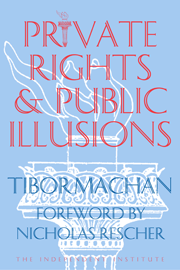When the government interacts with the citizenry, no bias is supposed to occur. This is why firms doing business with governments are forbidden to engage in any kind of discrimination, favoring one group of citizens over another. This is why juries must be chosen without prejudice against or in favor of certain groups.
All of this follows from the principles that everyone is supposed to be treated as equal under the law, something embodied in the 14th Amendment to the U.S. Constitution.
Public broadcasting, which is partly financed by the government, is often urged to be fair-minded, unbiased in the way it deals with various issues. You will notice that the famous "McNeil-Lehrer News Hour" always features pro and con positions on the topic of the day.
If a program seems to lean one way on a particular issue, PBS often assures viewers who complain that some other program tilts the other way.
And this is natural: With money taken from all citizens in taxes, it would be wrong to finance some faction’s view-point more vigorously than another’s.
Admittedly the idea of complete fairness is impossible to achieve. There simply isn’t enough time and money to do all viewpoints full justice, even if there were a serious intention to do so.
In fact, only prominent enough factions have their positions even considered, let alone presented. In this day of multiculturalism, for example, I have never seen a prominent representation of the Hungarian-American viewpoint, or that of Mongolian-Americans.
These groups, like thousands of others, simply lack the clout in Washington.
But lately there has been a most flagrant breach of fairness that cannot be excused based on limited resources or lack of constituency. PBS has been running ads, which can only be considered political promos, in support of its own alleged indispensability.
What do these promos say? They ask such questions as: "Who would do this program if PBS were not around to do so?" "What would we do about such and such programming without PBS?" In short, these are plain old political campaign slogans, aiming to promote a legislative agenda.
Here is the paradox: We have a corporation partly funded by the government that is using its position as a supposedly public service to promote the agenda of only a faction of the public, namely supporters of PBS. Of course, those who love PBS want it to be continued. But PBS is not a private-sector venture whose supporters are using their own wealth to undertake its various projects. The Corporation for Public Broadcasting funds PBS. A large percentage —around 15 percent — of the funding comes from taxes paid by all of us, not only by supporters of PBS. So this outfit has no business using your and my money to promote something you and I are opposed to.
Conceivably PBS can have a debate or talk show or public affairs program that would consider the issue of funding for CPB, PBS, and NPR. With guests or citizens presenting different views on the topic, such programs might be fair, an accurate expression of "the public." But that is not what is going on. Instead, PBS is itself promoting a political point of view.
The reason governments do not run churches or newspapers is that it is not the business of government to advocate various programs. Government is supposed to make sure that we can all strive to implement our ideas, to the extent our good fortune and hard work make that possible. But when government gets into the act with schools, colleges, universities, and broadcast networks, its role as a fair representative of the people is destroyed. That is one of several reasons PBS should be abolished.
PBS Promotes Agenda of a Minority Faction
Also published in The Orange County Register
Tibor R. Machan (1939–2016) was a Research Fellow at the Independent Institute and the R.C. Hoiles Professor of Business Ethics and Free Enterprise at Chapman University
Bureaucracy and GovernmentConstitutional LawCulture and SocietyGovernment and PoliticsLaw and LibertyPhilosophy and ReligionPrivatizationRace IssuesRegulationSocialism, Communism, and Collectivism
Comments
Before posting, please read our Comment Policy.








